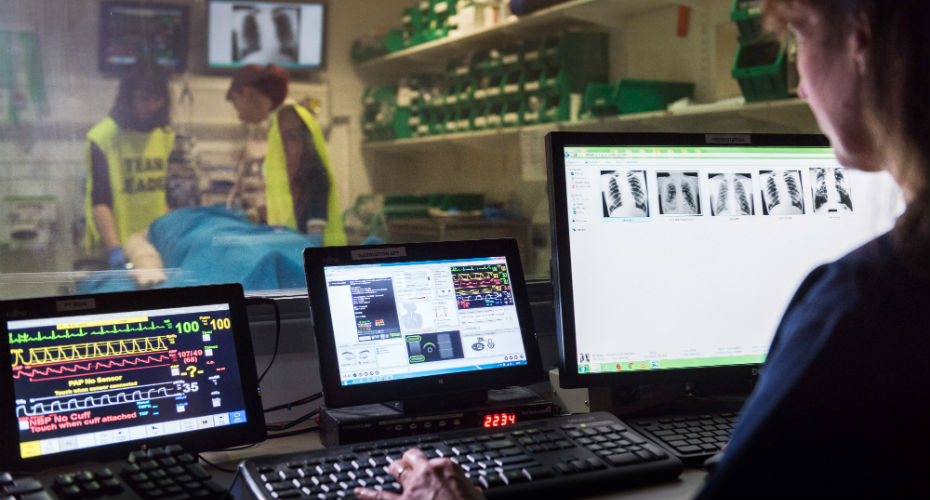| UCAS code | B821 |
|---|---|
| Duration | 3 years (or 4 years Integrated Masters) |
| Entry year | 2025 |
| Campus | St Luke's Campus |
| Discipline | Medical Imaging (Diagnostic Radiography) |
| Contact | Web: Enquire online |
| Typical offer | A levels: BBB |
|---|---|
|
A-Level: BCC |
Overview
- 88% of graduates in or due to start employment or further study fifteen months after graduation*
- You will become involve in learning about evidence-based practice and research approaches throughout the degree, which is led by our research-informed teaching.
- You’ll go on placements for 16 weeks each year, allowing you to fully integrate into your team and understand the full clinical experience
- Non-repayable maintenance grant between £5-8k per year
- Some students may be eligible to transfer to a four year Integrated Masters (MSci) programme at the end of year two. This offer will be made on the basis of academic performance in years one and two.
*based on full-time, first degree, UK domiciled graduates, HESA Graduate Outcomes survey 2018/19
![]()
Top 10 in the UK for Medical Technology
9th in the Complete University Guide 2025
![]()
4-month placement blocks each year - become part of the team
![]()
Option to transfer to an Integrated Masters (MSci) programme at the end of Year 2*
*(depending on academic performance in years 1 and 2)
Accreditations
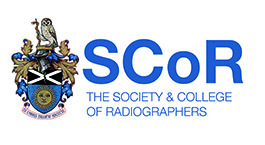
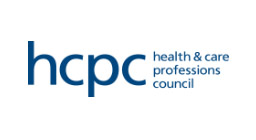
BSc Medical Imaging (Diagnostic Radiography) is approved by the Health & Care Professions Council and the Society and College of Radiographers
Entry requirements (typical offer)
| Qualification | Typical offer | Required subjects |
|---|---|---|
| A-Level | BBB |
GCE AL science grade B
GCE AL science includes: Biology/Human Biology*; Chemistry; Computing; Design and Technology; Electronics; Environmental Science; Environmental Studies; Geography; Geology; Maths/Pure Maths/Further Maths*; Life and Health Sciences; Physical Education; Physics; Psychology; Science (applied); Statistics. *If more than one of these is taken they would only count as one 'science' but could count as two A-levels towards our general requirements. |
| IB | 30/555 | HL 5 in a Science subject |
| BTEC | DDM | Applicants studying a BTEC Extended Diploma in Health Sciences will be accepted without the need for an additional A’ Level science subject. BTEC Extended Diplomas in other Science based subjects may be considered. All other applicants will be required to have grade B in an acceptable A ‘Level Science subject. |
| GCSE | C or 4 | Grade C or 4 in both Maths and English Language |
| Access to HE | 24 L3 credits at Distinction Grade and 21 L3 credits at Merit grade. | 12 L3 credits at Merit grade in a Science subject area. |
| T-Level | Merit | T-Level in Health Care Science |
| Contextual Offer | A-Level: BCC |
Specific subject requirements must still be achieved where stated above. Find out more about contextual offers. |
| Other accepted qualifications | ||
| English language requirements |
International students need to show they have the required level of English language to study this course. The required test scores for this course fall under Profile F. Please visit our English language requirements page to view the required test scores and equivalencies from your country. |
|
NB General Studies is not included in any offer.
Grades advertised on each programme webpage are the typical level at which our offers are made and provide information on any specific subjects an applicant will need to have studied in order to be considered for a place on the programme. However, if we receive a large number of applications for the programme we may not be able to make an offer to all those who are predicted to achieve/have achieved grades which are in line with our typical offer. For more information on how applications are assessed and when decisions are released, please see: After you apply
Access to Higher Education Diploma to Health Science or Science to include 24 Level 3 credits at Distinction Grade and 21 Level 3 credits at Merits Grade, including at least 12 Level 3 credits at Merit Grade in a relevant Science subject. All other Access to Higher Education Diploma applicants will be required to have grade B in an acceptable GCE AL science subject.
Contextual offer
We are committed to identifying the best possible applicants, regardless of personal circumstances or background. Please refer to our Applications policy
Completing your application form
Each application cycle starts in September. Your application should normally reach UCAS between 1 September and the UCAS equal consideration deadline.
Do I need work experience?
While work experience is not a mandatory entry requirement for our programme, you are encouraged to undertake work experience in a Radiography department to gain an insight in to your desired profession.
Will there be an interview?
If successful at the application stage, you will be invited to an interview during January to March, where you’ll undergo a small multiple mini interview (MMI), which consists of a series of short, structured interview stations used to assess your suitability for the programme.
During the interview day, we will be assessing your personal qualities, such as your communication skills, empathy, insight in to your own strengths and weaknesses, motivation to study radiography, etc.
What happens next?
All successful applicants after interview will be required to complete a health questionnaire and those accepting an offer will be screened by our Occupational Health Department.
You may be required to attend a medical examination as part of the admissions process. You will be required to have up to date vaccination records for relevant innoculations in line with University requirements and those of your placement providers.
We require all radiography students to be immunised against certain infectious diseases to meet health and safety standards required to work with patients. We will require students to provide evidence of two MMR jabs, and in addition undergo tests to determine their Hepatitis B surface antigen, TB and HIV status.
Enrolled radiography students will be unable to undertake their studies without evidence of completion of the vaccination process.
Please see the Medical Imaging Admissions Policy 2024 (PDF) for full details on our Medical Imaging admissions selection process. This policy is for 2024 entry, the policy for 2025 entry will be available from 1st June.
As you may be working with vulnerable people in a variety of clinical settings throughout the degree programme, all offers are conditional upon a Criminal Conviction Self Declaration and an enhanced disclosure check via the Disclosure & Barring Service (formerly the Criminal Records Bureau). We will review all significant reports of convictions, cautions and verbal warnings and decide on a candidate’s suitability to enter the programme.
International students
International students should check details of our English language requirements.
If your academic qualifications or English language skills do not meet our entry requirements our INTO University of Exeter centre offers a range of courses to help you reach the required language and academic standards.
International Foundation programmes
Preparation for entry to Year 1 of an undergraduate degree:
Foundation programme for Biomedical, Life and Environmental Sciences.
Further information
Please read the important information about our Typical offer.
For full and up-to-date information on applying to Exeter and entry requirements, including requirements for other types of qualification, please see the Applying section.
Course content
Our BSc (Hons) in Medical Imaging (Diagnostic Radiography) aims to ensure that, on graduation, you have the skills required to successfully embark on a career as a Diagnostic Radiographer and to be eligible to apply for registration with the Health and Care Professions Council (HCPC).
This full-time three-year programme includes clinical placements in hospitals across Cornwall, Devon, Dorset and Somerset, which stretch into the summer vacation and, as such, this programme is longer than those in other subjects. You will have three clinical placements as part of the degree programme, where you will attend a different placement site for four months during each year.
Placements
Around fifty percent of your time will be spent in clinical practice. Each clinical block is about 4 months in length. You go to a different placement site for each of your years of study. Our key NHS practice partners across the South West are:
- Royal Devon and Exeter
- Torbay
- Plymouth (Major Trauma Centre)
- Truro
- Barnstaple
- Taunton
- Yeovil
- Dorchester
In addition to these three core placements, students who transfer to the MSci will undertake a 7-week specialist placement during year 4.
The modules we outline here provide examples of what you can expect to learn on this degree course based on recent academic teaching. The precise modules available to you in future years may vary depending on staff availability and research interests, new topics of study, timetabling and student demand.
This year provides a foundation in the theoretical knowledge and practical skills required for radiography. Academic study provides theoretical knowledge of patient care, anatomy, imaging techniques, professional practice and the science that underpins medical imaging. This is then complemented with a clinical placement that provides practical experience in the safe and effective practice of general and fluoroscopic radiography. Modules cover patient care, anatomy and physiology, clinical imaging and practical placement.
This year provides a foundation in the theoretical knowledge and practical skills required for radiography. Academic study provides theoretical knowledge of patient care, anatomy, imaging techniques, professional practice and the science that underpins medical imaging. This academic knowledge is then complemented with a clinical placement that provides practical experience in the safe and effective practice of general and fluoroscopic radiography.
Compulsory modules
| Code | Module | Credits |
|---|---|---|
| PAM1016 | Research and Evidence Based Practice | 15 |
| PAM1018 | Foundations of Patient Care | 15 |
| PAM1019 | Anatomy and Physiology for Radiographers | 30 |
| PAM1020 | Fundamentals of Radiographic Practice | 30 |
| PAM1007 | Practical Placement 1 | 30 |
Year two develops further understanding of anatomical and physiological concepts in contemporary clinical imaging practice. You will develop your knowledge of radiation science and gain an appreciation of safe and optimal use of radiation-based imaging techniques, alongside a clinical placement. You’ll cover clinical imaging, pathology for radiographers and science for medical imaging, among other modules.
Drawing upon the knowledge and skills learnt in year one, year two develops further understanding of anatomical and physiological concepts in contemporary clinical imaging practice. You will develop your knowledge of radiation science and gain an appreciation of safe and optimal use of radiation-based and non radiation-based imaging techniques. The year two clinical placement provides further practical experience of the safe and effective practice of general and fluoroscopic imaging and introduces interventional radiography and other imaging modalities.
Compulsory modules
| Code | Module | Credits |
|---|---|---|
| PAM2013 | Medical Imaging Applications | 30 |
| PAM2007 | Project Studies 1 | 15 |
| PAM2011 | Science for Medical Imaging | 15 |
| PAM2014 | Pathology and Image Interpretation 1 | 30 |
| PAM2006 | Practical Placement 2 | 30 |
In the final year, you will integrate theory with practice by drawing on your prior experience of imaging modalities, and reinterpreting your knowledge of imaging within a scientific framework. During your final clinical placement you will become an integral member of the multi-professional healthcare team, having responsibility for organising your working day and liaising with staff in other departments, and will gain experience of managing an inter-professional team. Modules include skeletal image interpretation, digital image processing and professional skills for radiographers.
The final year builds upon the knowledge and skills established in the previous two years. You will integrate theory with practice by drawing on your prior experience of imaging modalities, and reinterpreting your knowledge of imaging within a scientific framework. During the third clinical placement you will become an integral member of the multi-professional healthcare team. You will have responsibility for organising your working day and liaising with staff in other departments, and will gain experience of managing an inter-professional team.
Compulsory modules
| Code | Module | Credits |
|---|---|---|
| PAM3018 | Practice Placement 3 | 30 |
| PAM3004 | Project Studies 2 | 30 |
| PAM3019 | Pathology and Image Interpretation 2 | 30 |
| PAM3012 | Digital Image Processing for Radiographers | 15 |
| PAM3020 | Professional Skills for Radiographers | 15 |
Integrated Masters: MSci Medical Imaging
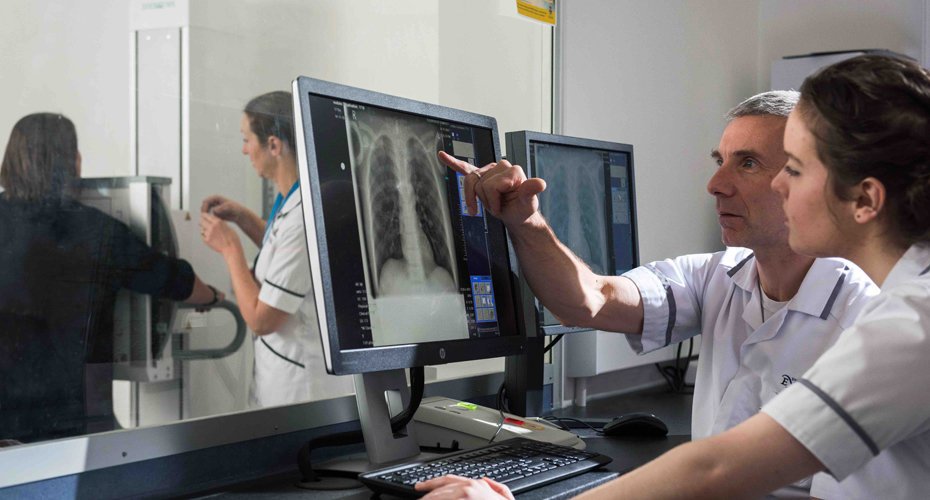
You can potentially transfer to our four-year MSci Medical Imaging course at the end of your second year (subject to performance).
The MSci Masters-level course is designed to offer improved preparation for working in cross-sectional imaging. It will broaden your understanding of medical imaging technologies, allowing greater specialisation and career advancement in the future.
If you transfer to the MSci, you will study the 3 years of BSc modules, plus an additional fourth year which includes a 10-week specialist placement.
MSci Medical Imaging (Diagnostic Radiography) modules
You may take optional modules as long as any necessary prerequisites have been satisfied, where the timetable allows and if you have not already taken the module in question or an equivalent module.
Stage 1: 120 credits of compulsory modules, 0 credits of optional modules
Compulsory modules
| Code | Module | Credits |
|---|---|---|
| PAM1007 | Practical Placement 1 | 30 |
| PAM1016 | Research and Evidence Based Practice | 15 |
| PAM1018 | Foundations of Patient Care | 15 |
| PAM1019 | Anatomy and Physiology for Radiographers | 30 |
| PAM1020 | Fundamentals of Radiographic Practice | 30 |
Stage 3: 120 credits of compulsory modules (120 Level 6;), 0 credits of optional modules
Compulsory modules
| Code | Module | Credits |
|---|---|---|
| PAM3004 | Project Studies 2 | 30 |
| PAM3012 | Digital Image Processing for Radiographers | 15 |
| PAM3018 | Practice Placement 3 | 30 |
| PAM3019 | Pathology and Image Interpretation 2 | 30 |
| PAM3020 | Professional Skills for Radiographers | 15 |
Stage 4: 90 credits of compulsory modules (90 Level 7), 30 credits of optional modules (all Level 7)
Compulsory modules
| Code | Module | Credits |
|---|---|---|
| PAMM111 | Scientific Principles of Cross-sectional Imaging | 15 |
| PAMM112 | MRI: Theory and Applications | 30 |
| PAMM113 | CT: Theory and Applications | 30 |
| PAMM114 | Cross-sectional Imaging Practice Placement | 15 |
Optional modules
| Code | Module | Credits |
|---|---|---|
| HPDM092 | Fundamentals of Research Design | 15 |
| HPDM128 | Principles of Advanced Clinical Practice | 30 |
| HPDM142 | Principles of Supervision, Mentoring and Coaching | 15 |
| HPDM081 | Management in Healthcare | 15 |
| HPDM105 | Education Essentials | 15 |
Fees
Tuition fees for 2024 entry
UK students: £9,250 per year
International students: £29,700 per year
NHS Learning Support Fund
Through the NHS Learning Support Fund, students starting or continuing study on a range of Nursing and Allied Health degrees at undergraduate or postgraduate level can apply for a Training Grant of £5,000 per academic year.
Potential extra payments worth up to £3,000 per academic year will be available for eligible students. This includes £1000 for those studying in an area of shortage specialism, including radiography (diagnostic and therapeutic) and mental health nursing. Find out more and how to apply on the NHS Learning Support Fund website.
Scholarships
The University of Exeter has many different scholarships available to support your education, including £5 million in scholarships for international students, such as our Global Excellence Scholarships*. Financial support is also available for students from disadvantaged backgrounds, lower income households and other under-represented groups to help them access, succeed and progress through higher education.
* Terms and conditions apply. See online for details.
Learning and teaching
Your learning is through lectures, tutorials and seminars with clinical placements in the Radiology Department of one of our placement hospitals across the South West. We are strongly committed to offering high levels of student support. You will have a Personal Tutor at the University and during your clinical placements you will be visited fortnightly by a Clinical Tutor who will offer both personal and academic support.
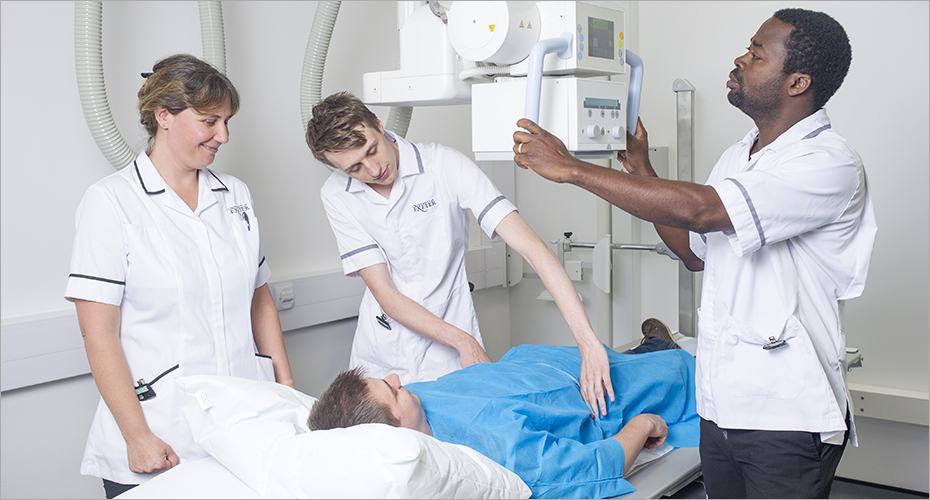
Research-led teaching
We believe every student benefits from being part of a research-led culture and being taught by experts – you will discuss the very latest ideas in seminars and tutorials and become actively involved in research yourself. Research plays an important part in developing patient care and radiography as a whole for the future. You will be taught by staff who are at the cutting edge of their research areas which ensures you receive the most up-to-date knowledge. During your third year you will undertake a research project in which you will investigate a particular aspect of radiography in detail and may have the opportunity to work alongside research staff on current clinical projects.
Assessment
You will be assessed by a combination of continuous assessment (both academic and clinical) and exams. The ratio of continuous assessment to exams is approximately 5:4. You will have to pass the assessments in your first year to proceed to the second year but they do not count towards your degree classification. The assessments in the second and third year will each contribute to your final degree classification.
Clinical Placements
The clinical placements are within Radiology Departments in one of our 8 placement hospitals: Barnstaple, Plymouth, Dorchester, Exeter, Taunton, Torbay, Truro and Yeovil. You will spend time at a different placement site each year in order to ensure you get a wide range of clinical experience whilst exploring all that the South West has to offer; be prepared that at least once in the three years it is likely that you will be allocated to a placement site which will require you to move to onsite accommodation. The cost of this accommodation can be reimbursed, dependent on your personal circumstances. In addition this process can take a few weeks, so will need to be considered when budgeting for this course.
During your first placement, you will be working for four and a half days a week, between the hours of 9am and 5pm. In the second and third years you will undertake some weekend and out-of-hours duties. You will always be supervised by a qualified member of staff.
The placements last for four months each and the first year placement will end in mid-August, so the holiday times for this degree do not fall in line with other university courses.
These placement sites will be allocated at least a term in advance of the placement occurring, with the majority of students being given one of their top three preferred choices. Please note you will not be able to return to a placement site that you have previously been to.
Optional modules outside of this course
Each year, if you have optional modules available, you can take up to 30 credits in a subject outside of your course. This can increase your employability and widen your intellectual horizons.
Proficiency in a second subject
If you complete 60 credits of modules in one of the subjects below, you may have the words 'with proficiency in [e.g. Social Data Science]' added to your degree title when you graduate.
- A Foreign Language
- Data Science
- Entrepreneurship
- Innovation
- Law
- Leadership
- Social Data Science
Your future
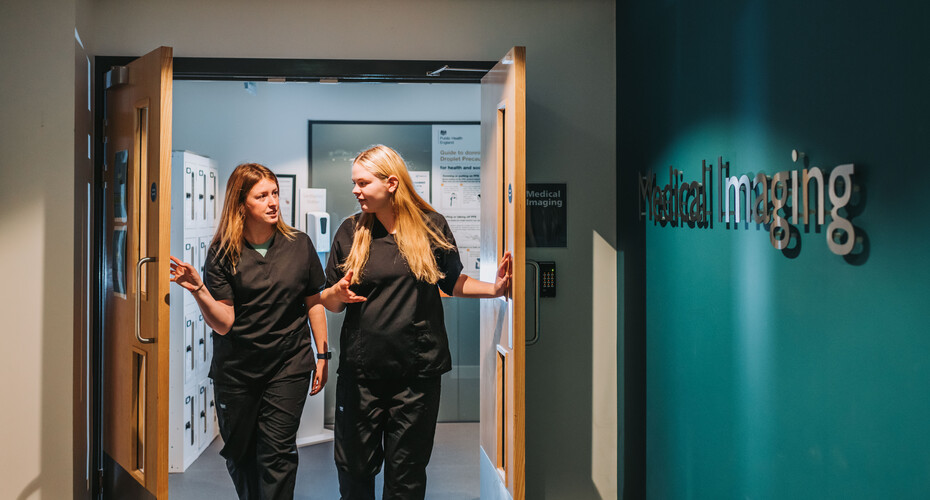
A Medical Imaging degree is a passport to an interesting job and a fulfilling career. There is a grading structure that sees an individual’s salary increase as they move up the profession. There are also management opportunities and consultant radiography posts are planned.
Radiographers trained in the UK are recognised as being among the best in the world and the health providers of many countries recruit in the UK. On graduation you will be eligible to apply for registration as a diagnostic radiographer with the Health and Care Professions Council (HCPC) and for membership of the Society and College of Radiographers. Preparing students for employment is an essential part of our programme.
In addition to the assessed academic and personal skills integrated within the programme, there is a schedule of additional activities designed to enhance the employability of our graduates. 88% of our Medical Imaging students are in or due to start employment or further study fifteen months after graduation.*
Further information on Diagnostic Radiography can be found at:
*based on full-time, first degree, UK domiciled graduates, HESA Graduate Outcomes survey 2018/19
I love that our placements are formed of one large block per year as it really gives you the chance to settle into your placement hospital, allowing you to gain confidence in your own abilities and to push yourself out of your comfort zone with people you have built trust with over the four month period.
Katie
BSc Medical Imaging (Diagnostic Radiography)
